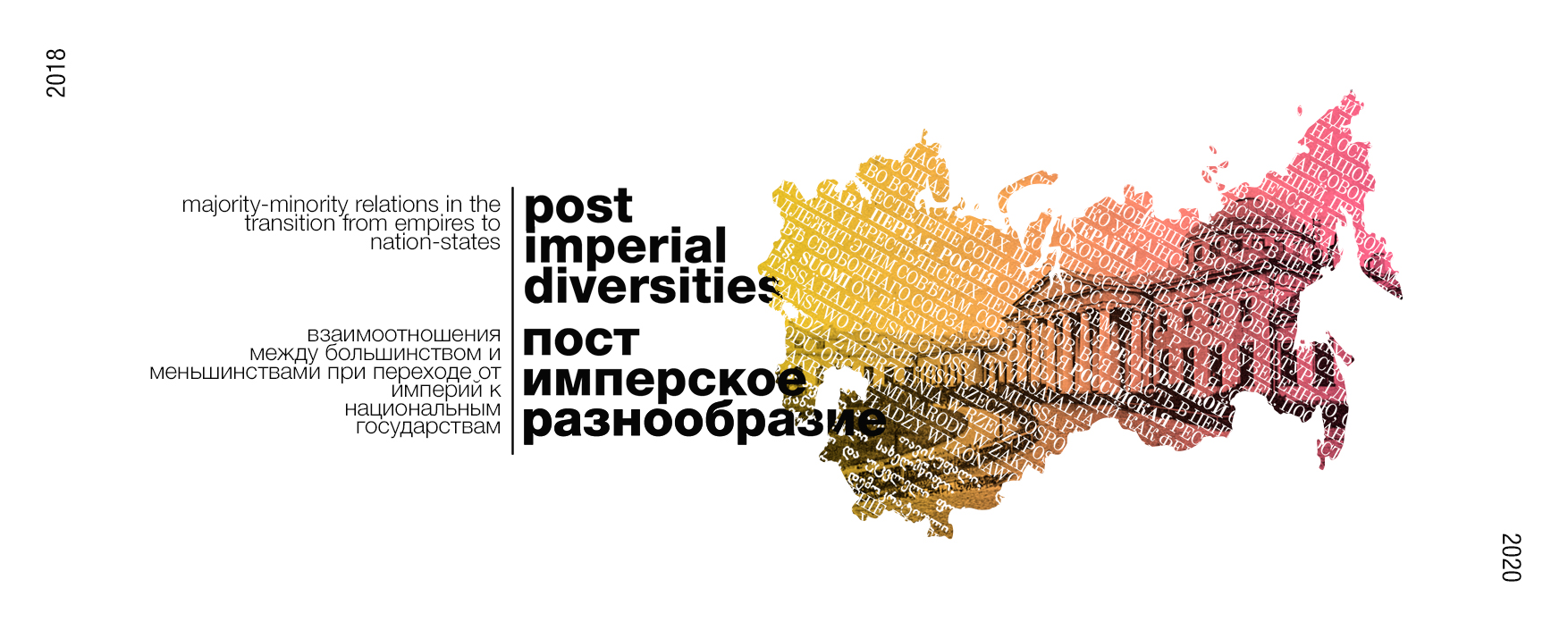Post-imperial diversities

the illustration by: Daniil Akhmerov
Majority-minority relations in the transition from empires to nation-states
The project brings together researchers from the Higher School of Economics, St Petersburg, Russia, the Karelian Institute of the University of Eastern Finland and the Max Planck Institute for the Study of Religious and Ethnic Diversity of the University of Goettingen, Germany. The overall aim is to examine in a multidisciplinary and comparative perspective the governance of ethnic, linguistic and religious diversity at times of transition from Imperial to nation-state political formations in Eurasia. Domestic and international influences on conceptions of the status of minorities will be examined as well as actual legal implementation of those concepts. From close analysis of the situation at the end of Empire, the consortium will be able to make comparisons and draw conclusions as to the influence of earlier developments on the situation of minorities in post-Imperial contexts.
The project’s research design is comparative. Systematic comparisons will be made across Empires, across historical time and across markers of cultural boundaries. The Russian Empire in the early twentieth century and the Soviet Union in the late 1980s make up the core case studies. These will be supplemented for comparative purposes by involving scholars of the Ottoman, Habsburg and British Empires, for example. International documents including those associated with the Versailles process, the League of Nations, United Nations, and the Helsinki Final Act as well as the monitoring mechanisms attached to them will also be included. Methodical analysis of historical approaches to conflicts over minorities in terms of language, religion, ethnic and cultural identity at times of intense political change will be used to inform our understanding of current conflicts over the status of minorities. The collaborative research project will thus not only facilitate capacity-building and international cooperation between high profile research institutions, it will also provide background knowledge for key issues of public policy making in the contemporary period.
The project is being implemented in 2018-2020 as part of a fundamental research competition conducted by the RFBR together with organizations participating in the ERA.Net RUS Plus program.
Project Leaders
Director of the Centre for Historical Research, Professor
Project News
The documentary publication by Mariia Gulakova and Alexander Semyonov in "Ab Imperio" 2/2021
The new issue of "Ab Imperio" features the publication prepared by Mariia Gulakova and Alexander Semyonov within the Era.net Rus Plus project "Post-imperial diversities". This documentary publication pertains to the discussion of the State Duma elections from special provinces and regions for the period from June to December 1905.
"Boundaries of History": Book presentation "The Lawful Empire: Legal Change and Cultural Diversity" by Dr. Stefan B. Kirmse
On March 04, Dr. Stefan B. Kirmse (Leibniz Center of Oriental Studies) presented his book The Lawful Empire: Legal Change and Cultural Diversity in Late Tsarist Russia at the research seminar “Boundaries of History”
What does it mean to be a postdoc at HSE? Experience of Ksenia Maksimovtsova
HSE implements a program of Russian postdocs. Ksenia Maksimovtsova shares her experience of participation in the program. During the program Rsenia was involved in the international research project "Post-imperial Diversities".
New articles by Alexander Semyonov and Anton Kotenko
Articles have been prepared as part of the "Post-Imperial Diversity" project which is being implemented in 2018-2020 as part of a fundamental research competition conducted by the RFBR in the Era.net RUS Plus Research Program in a research consortium with the Karelian Institute of the University of Eastern Finland and the Max Planck Institute for the Study of Religious and Ethnic Diversity of the University of Goettingen, Germany.
"Boundaries of History": Laurie Manchester about Russians from Harbin
On September 5, the first seminar in this academic year, “The Shifting Identities of Russian Repatriates from China Before and After the Collapse of the Soviet Union,” was held as part of the “Boundaries of History” program. Laurie Manchester from Arizona State University, USA, spoke to students and professors.
Conference "Versailles and Rights: A Centenary Appraisal" was held at Helsinki
On June 3-4, 2019 at Helsinki was held a conference "Versailles and Rights: A Centenary Appraisal" organized in frames of the research project "Post-imperial diversities: Majority-minority relations in the transition from empires to nation-states" together with the Helsinki Collegium for Advanced Studies.
"Boundaries of History": Sabine Dullin (Sciences Po) on Soviet Borders as thickening zones
On June 13, 2019 Department of History and the Center for Historical Research at the HSE in St Petersburg had a session of the “Boundaries of History” research seminar where Dr. Sabine Dullin, Professor in Contemporary History at Sciences Po (Institut d’études politiques) and the author of the book “Men of Influence: Stalin's Diplomats in Europe, 1930-1939” presented the talk “Soviet Borders as thickening zones. The political imagination and practices of an old but new state (1917-1940)”.
"Boundaries of History": Wiktor Marzec about Lodz as industrial city and discourses of asynchronous modernity in 1897-1994
The study of professor Marzec and his colleagues is unique in its interdisciplinary approach, seeking to stretch the bridge between history, cultural studies and sociology. The book “From Cotton Smoke: Lodz – Industrial City and Discourses of Asynchronous Modernity, 1897-1994” is a tangible contribution to urban research and the study of modernity.
Etienne Peyrat's Talk
On February 15, 2019 the Center for Historical Research at the HSE in St Petersburg hosted an ERA.Net research seminar. Etienne Peyrat (Sciences Po Lille) presented his talk "Imperial transition and regional integration in the South Caucasus (1900s-1930s)".
Have you spotted a typo?
Highlight it, click Ctrl+Enter and send us a message. Thank you for your help!
To be used only for spelling or punctuation mistakes.
